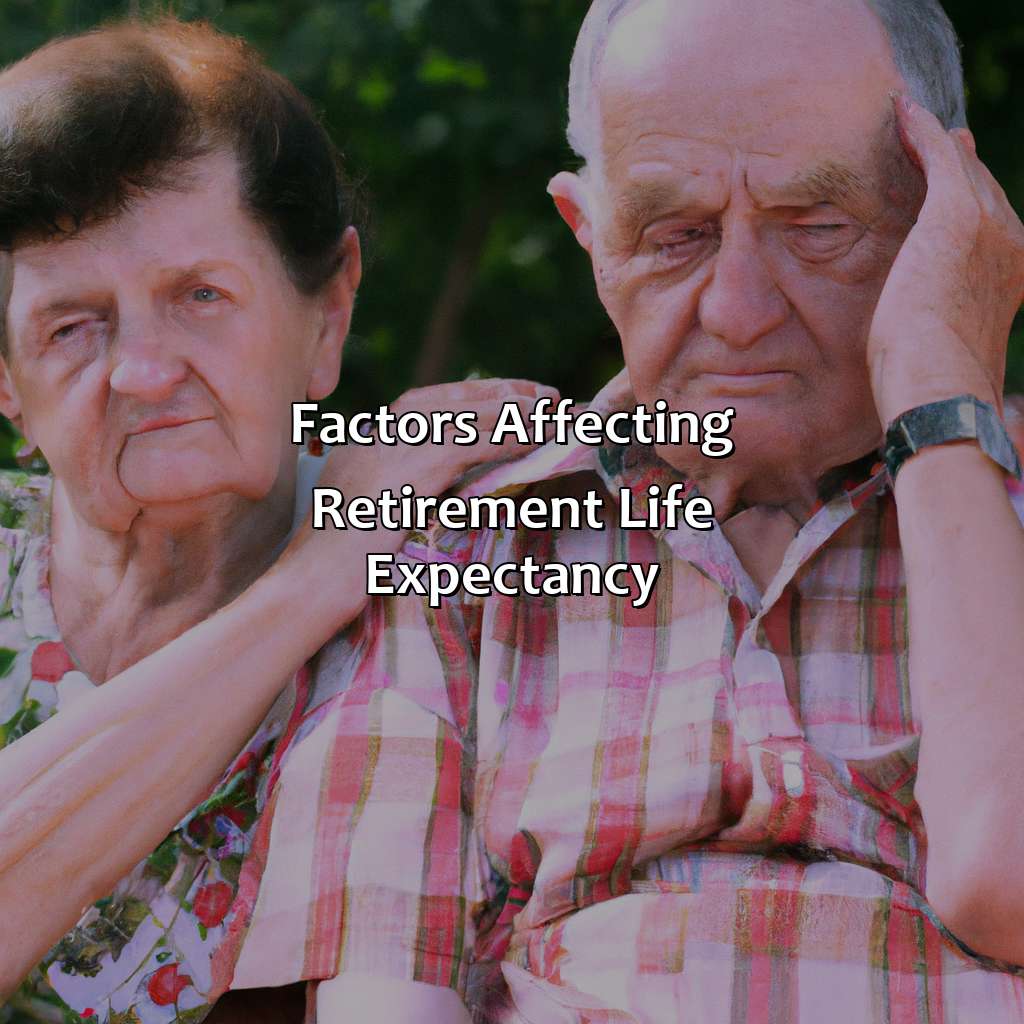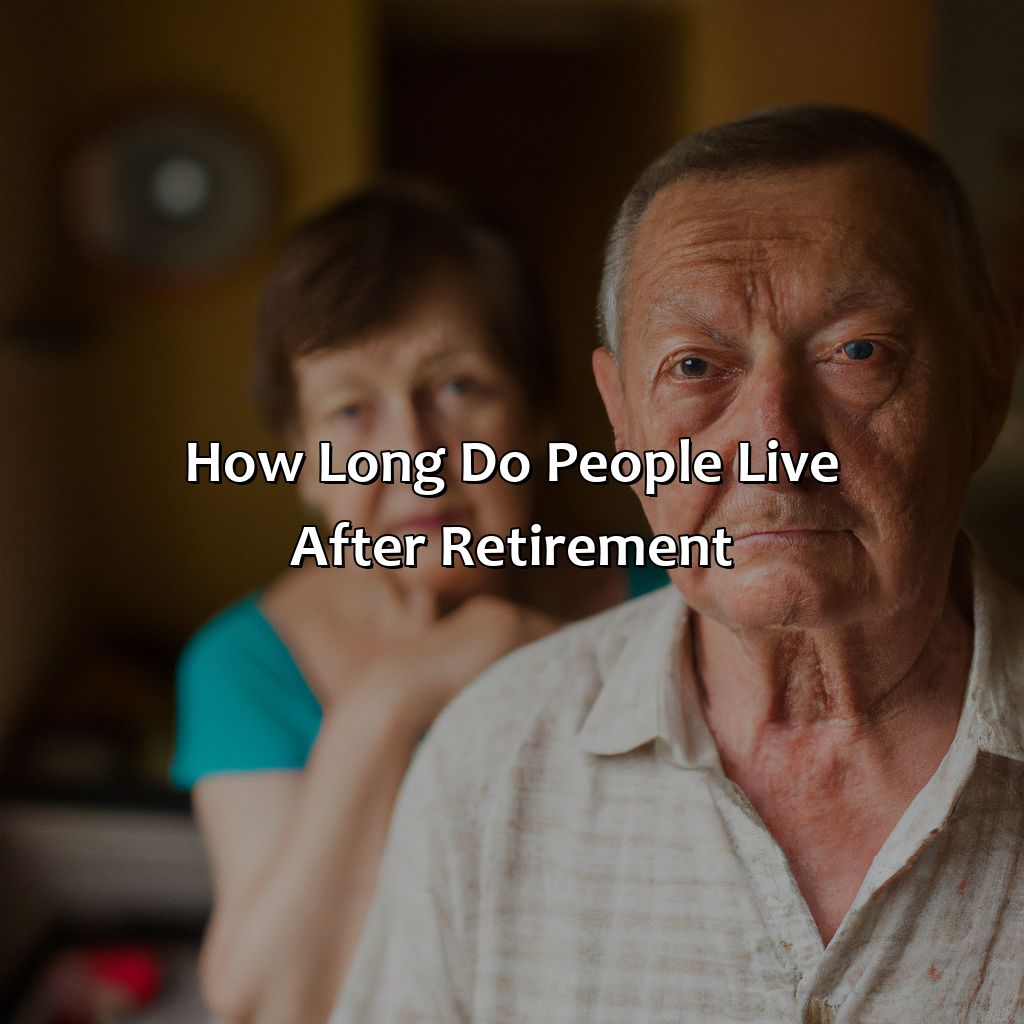How Long Do People Live After Retirement?
Key Takeaway:
- Retirement life expectancy varies based on several factors, including health condition before retirement, lifestyle after retirement, and financial situation after retirement. It is important to plan for a long retirement to ensure that you are financially stable and able to enjoy your golden years.
- Factors such as smoking, poor diet, and lack of exercise can have a negative impact on retirement life expectancy. Conversely, engaging in physical and social activities, maintaining a healthy diet, and seeking medical attention when needed can help increase life expectancy.
- Strategies for a longer retirement life include staying physically and socially active, maintaining a healthy diet, and seeking medical attention as needed. Additionally, it is important to have a solid financial plan for retirement to ensure that you have enough savings to cover your expenses for a long retirement.
Retirement can be an exciting and daunting next chapter. You may be wondering how long the average person lives after they stop working. This article will provide insight on the life expectancy of retirees and what to consider when planning for retirement.
Retirement Life Expectancy
Retirees have a period of life after they end their working careers, also known as the retirement phase. During this interval, they experience Retirement Life Expectancy, which is the expected age of passing away after retirement. This period may vary, based on various factors such as lifestyle choices, healthcare quality, and socio-economic status.
Changes in social trends, technological advancements, and medical advancements have led to an increase in the Retirement Life Expectancy. Typically, people tend to live longer after they retire, indicating that the available pension or funds may have to last longer than before. Moreover, at an advanced age, the healthcare expenses may rise, which may impact the available funds.
It is observed that the Retirement Life Expectancy may vary between the genders, locations, and other factors. For instance, city dwellers tend to live longer than their rural counterparts, while women tend to have a longer Retirement Life Expectancy compared to men. Understanding and planning for these variations can help individuals make informed decisions for their post-retirement life.
Pro Tip: One way to ensure that the retirement funds are available for a more extended period is to consider an annuity or a pension plan in addition to the savings and investments. These options can provide a guaranteed stream of income for life, ensuring the quality of life in the retirement phase.

Image credits: retiregenz.com by James Jones
Factors Affecting Retirement Life Expectancy
Understand factors that affect your retirement life expectancy? Check out “How Long Do People Live After Retirement?” article. This section will highlight three key elements. Let’s start with your health condition before retirement. It can influence your longevity after retiring. Additionally, take a look at the important role that financial situation plays in determining how long you can live after retiring.

Image credits: retiregenz.com by Harry Jones
Health Condition Before Retirement
The state of one’s health before entering retirement can impact their life expectancy post-retirement. A person’s health condition at that juncture determines their capacity to undertake social, physical, and mental activities in later periods. The healthier the individual before retiring, the higher the chances of longer life expectancy after retirement.
Maintaining good physical and mental fitness helps to ward off chronic illnesses. Those who engage in regular exercise routines find themselves better shielded against diseases such as heart disease, diabetes and hypertension which are common causes of death. Similarly, sound mental health through socializing and community engagement reduces susceptibility to depression, cognitive decline and premature death.
Aside from lifestyle choices, genetics also play a pre-eminent role in determining one’s life expectancy after retiring. Individuals with a predisposition to chronic illnesses such as Alzheimer’s or cancer may have a shorter lifespan regardless of their initial health status. Age also affects life expectancy, as individuals over 65 tend to face more significant health complications due to lowered organ function compared to younger individuals.
There are numerous examples of people with excellent physical and mental conditions before retiring living long fulfilling lives despite particular challenges along the way such as Steve Jobs who died at 56 years but was very productive until shortly before his death.
Retirement is the perfect time to pursue your passion, whether it’s napping or complaining about the younger generation.
Lifestyle After Retirement
Retirees’ Way of Living
Retirement marks the start of a new way of living for individuals. The lifestyle after retirement varies from person to person. Several retirees prefer to lead an active life by engaging in volunteer activities and pursuing hobbies, while many choose a relaxed lifestyle with minimal social interaction. The choice of one’s way of living depends on various factors like financial status, health conditions, and personal preferences.
Moreover, staying busy after retirement is crucial for maintaining physical and mental well-being. People who stay alone often suffer from depression and loneliness post-retirement. In contrast, engaging in social activities or opting for a part-time job can keep retirees motivated and instill a sense of purpose.
Furthermore, taking care of physical health through regular exercise and healthy eating habits can largely impact one’s post-retirement lifestyle as it reduces the risk of chronic diseases that may limit mobility or cognitive skills.
Therefore, retirees must explore their options positively to live their golden years to the fullest instead of regretting their choices later. After all, one cannot miss out on this beautiful phase due to wrong choices or inaction.
Retirement savings: the only thing that should be shrinking after retirement.
Financial Situation After Retirement
The financial stability of an individual after retirement relies on various factors, such as savings, investments, expenses and crucial life events. Managing finances efficiently during the working tenure can increase the chances of a stable post-retirement life with no financial stress.
One must take into consideration the different expenditures and standard of living before embarking on their retirement journey. Having a proper budget plan that fulfills all needs is essential to maintain financial stability after retirement. Having a solid financial backup in terms of pension schemes and annuities can be helpful to meet expenses without depending on everyday earnings.
Managing investments according to personal needs and analyzing market trends also impact the overall financial situation after retirement. Properly balancing between high-risk and low-risk investment schemes can secure income streams for the long-term post-retirement period.
Moreover, having medical insurance policies to cover unforeseeable events like hospitalization, surgeries etc., are crucial to avoid unexpected out-of-pocket expenditures that may drain resources quickly.
Failing to build up an adequate retirement pool can lead to unfavorable consequences in later stages of life. Therefore, it is highly recommended for individuals currently employed to make efforts in savings and invest prudently, building a robust backup towards future retirement planning.
Retirement tip: Keep a positive attitude and a few good friends around. And if all else fails, invest in cryogenics.
Strategies for a Longer Retirement Life
For a more fulfilling and longer retirement life, engage in physical and social activities. Also, maintain a healthy diet. Additionally, seek medical attention and follow medical advice. These strategies will help you adjust to physical and mental changes during retirement. Thus, you will have a healthier, more enjoyable retirement life.

Image credits: retiregenz.com by Harry Washington
Engage in Physical and Social Activities
For a healthy and fulfilling retirement, it’s important to maintain physical and social engagement. Here are some strategies:
- Regular Exercise: Engage in physical activities like walking, yoga, or swimming to maintain good health and improve mobility.
- Volunteer Work: Get involved in community services or volunteering to keep yourself socially engaged and active.
- Attend Events: Attend cultural events, concerts or club meetings regularly to socialize and combat isolation.
- Take a Course: Enroll in community college courses or take up a new hobby to learn something new and stay mentally stimulated.
- Travel: Explore the world around you and visit new places with your family or friends for mental relaxation.
- Active Hobbies: Explore hobbies like gardening, painting, pottery making etc., that keep you physically active mentally calm
Furthermore, engaging in physical activities is not just about having fun. It can also help prevent many health problems such as heart disease, diabetes, obesity etc. Thus it is vital that seniors include them in their daily routine.
To live life at its fullest even after retirement – stay active and engaged both socially and physically by participating in activities that interest you. You don’t want to miss out on all the amazing things life has to offer!
Retirement may mean saying goodbye to your daily commute, but not to your daily bowl of kale salad.
Maintain a Healthy Diet
Eating for a Longer Retirement Life
Maintaining a healthy diet is crucial to living a liveable retired life. Here are five essential points for maintaining a wholesome diet-
- Include fruits and vegetables in your daily meals
- Reduce processed foods and sugar intake
- Include sources of lean protein such as beans, nuts, fish, and poultry
- Limit unhealthy fats such as saturated and trans-fat found in fried or fatty foods
- Stay hydrated by drinking plenty of water throughout the day
Eating nutritious food can lower the risk of chronic diseases related to ageing, including heart disease, cancer and diabetes. A low-glycemic-index diet and reducing alcohol consumption may also prevent age-related metabolic changes that can lead to increased inflammation. Though nutritional needs may change with age, making small dietary tweaks can have positive health impacts.
Pro Tip: Opting for nutrient-rich whole foods over supplements ensures that you receive all necessary vitamins, minerals and fibre needed for overall wellbeing.
Seek Medical Attention and Follow Medical Advice.
Ensuring that you prioritize your health after retirement is crucial. It is highly recommended to opt for regular medical check-ups and follow any medical advice provided by your healthcare provider. Consistency in seeking medical attention and adhering to sound professional medical guidance can increase the longevity of your retirement life.
By frequently visiting a healthcare expert, you can be aware of any underlying illnesses, which enhances early detection and swift management. This way, any medical issue can be sorted with urgency, eventually improving general health before it deteriorates. A healthy lifestyle involving exercise, balanced diet and proper rest are also the keys to maintaining good health throughout the retirement years.
It’s essential to note the numerous benefits that come with staying consistent in prioritizing one’s health during retirement life. A healthy life ensures that you can enjoy a satisfying post-working life free from frequent hospital visits or chronic diseases caused by poor health choices. Regular doctor visits can help catch previously undetected illnesses early before they develop into long-term issues requiring expensive and extensive treatment.
A true story experienced by some retirees involves missing out on valuable time after omitting critical advice on healthier living from their physicians, leading to severe long-term ailments such as heart disease and diabetes complications. By looking after your health through regular appointments with qualified medical personnel and following advice given to you can prolong retirement life duration significantly.
Five Facts About How Long People Live After Retirement:
- ✅ The average life expectancy after retirement is around 18 years. (Source: SSA)
- ✅ Women tend to live longer than men after retirement, with an average of 20.6 years versus 17.2 years, respectively. (Source: Census Bureau)
- ✅ The likelihood of living to age 100 or more increases for those who live past age 65. (Source: Pew Research Center)
- ✅ Retirement savings, access to healthcare, and lifestyle choices all play a role in determining life expectancy after retirement. (Source: AARP)
- ✅ Social isolation and lack of social support can negatively impact the health and well-being of retirees and decrease life expectancy. (Source: Harvard Health Publishing)
FAQs about How Long Do People Live After Retirement?
How long do people typically live after retirement?
On average, people who retire at the traditional age of 65 can expect to live another 18-20 years. However, this varies depending on factors such as gender, lifestyle choices, and overall health.
Does retiring early affect lifespan?
Studies have shown that retiring early may actually lead to a shorter lifespan. This could be due to decreased social engagement, loss of purpose, and reduced physical activity. However, this is not always the case and ultimately depends on the individual.
How does gender affect life expectancy after retirement?
Women tend to live longer than men after retirement, with an average life expectancy of 21 years compared to 17 years for men. This is due to various factors such as biological differences and lifestyle choices.
What are some lifestyle factors that can impact life expectancy after retirement?
Healthy lifestyle choices such as regular exercise, a balanced diet, and not smoking can increase life expectancy after retirement. On the other hand, heavy alcohol consumption, poor diet, and lack of exercise can decrease life expectancy.
Does socioeconomic status affect life expectancy after retirement?
Unfortunately, there is a correlation between lower socioeconomic status and lower life expectancy after retirement. This is due to factors such as limited access to healthcare, higher levels of stress, and greater exposure to environmental hazards.
Can retiring later increase life expectancy after retirement?
While there is no guarantee, some studies have shown that continuing to work past traditional retirement age can lead to increased life expectancy. This may be due to the social engagement and mental stimulation that comes with work, as well as the financial benefits of continued employment.





